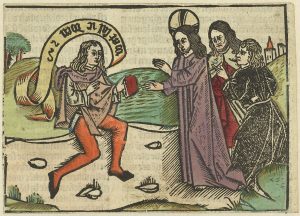Thoughts on Sunday’s Lessons for Oct. 10, 2021
First Reading (Track One): Job 23:1-9, 16-17
Job has been tormented beyond imagination and has lost everything: all of his possessions and much of his family are gone. His friends, seeking to console him, have done a very poor job of showing compassion. He must have done something wrong, they scolded him in the verses before this reading.

Christ and the Rich Young Man (1485-1491), woodcut manuscript illumination printed on paper by the anonymous Master of Antwerp in a 15th century bible translation. (Click image to enlarge.)
They wondered if his lack of piety or his great wickedness might have angered God. In Sunday’s Track One first reading, Job responds with bitter, angry words: He deserves a chance to lay out the facts. He has a right to argue his case before God. If only he could get a hearing before God, he is sure that he would prevail. But although he looks in every direction, he can’t find God anywhere. He is terrified, and he wants to vanish into darkness. Stay tuned: Next week we’ll hear how God responds.
First Reading (Track Two): Amos 5:6-7, 10-15
A powerful theme flows through Sunday’s readings, reminding us how important it is to subject ourselves to God. We must behave justly and treat the poor generously, never stealing from those less fortunate; and, we hear in the Gospel, we are to give everything that we have to the poor. In the Track Two first reading, the Prophet Amos warns Israel’s Northern Kingdom that its habit of living well while “trampling” on the poor will lead to disaster. “Seek good and not evil,” urges the prophet who, a few verses after this passage, will exhort the people of God to “let justice roll down like waters, and righteousness like an ever-flowing stream.”
Psalm (Track One): Psalm 22:1-15
When Jesus was dying on the cross, in his last agony he cried out the words that begin Psalm 22: “My God, my God, why have you forsaken me?” So begins this reading, which the New Revised Standard Version titles “Plea for Deliverance from Suffering and Hostility.” It echoes Job’s lament in the cry of one who is strung out, knocked down, worn out, feeling the depth of despair and no place to turn … except to God, who knew them as an infant and who, they pray, will be there for them now.
Psalm (Track Two): Psalm 90:12-17
In the portion of this Psalm that precedes the verses we hear in this reading, the author – held by tradition to be Moses himself – has warned of God’s anger with a sinful people. Now in this passage he calls on God to return, to show loving-kindness, to teach the people to be wise, and to replace adversity with gladness. Through God’s works, grace and splendor, the Psalmist prays, may the people be wise, turn the work of our hands to God’s purposes, and enjoy the prosperity that our handiwork may yield.
Second Reading: Hebrews 1:1-4; 2:5-12
The writer of Hebrews musters surprisingly warlike images of Jesus in this short passage, presenting him as a frighteningly sharp two-edged sword that pierces, divides, cuts soul apart from spirit and our body’s joints from our bones’ marrow. We are laid bare, called to account before God! Yes, God expects much of us. But we also hear that Jesus knows and understands us. Although Jesus is our great high priest who has passed through the heavens, he also can sympathize with our weakness, having been tested in every way as we are tested. We may approach the throne of grace boldly, seeking mercy and receiving grace.
Gospel: Mark 10:17-31
“Go, sell what you own, and give the money to the poor … then come, follow me.” Really? This parable appears, with slightly different details about the man, in the Gospels of Mark, Matthew, and Luke. Luckily for us, this parable is obviously not to be taken literally. We’re not expected to give everything we own to the poor. Uh, are we? Perhaps these verses, like the Sermon on the Mount, challenge us by setting Jesus as a standard of perfection that we can aim for but won’t likely reach. Or perhaps we are meant to squirm a little as we recognize just how rich we are, and ask ourselves if our possessions stand between us and real love of God and neighbor, just as Jesus, in Mark’s version, looked at the man and loved him.
